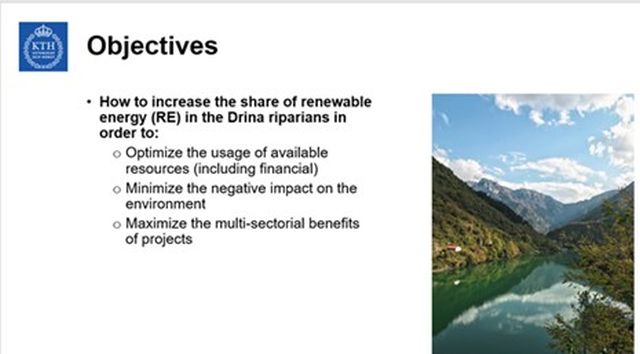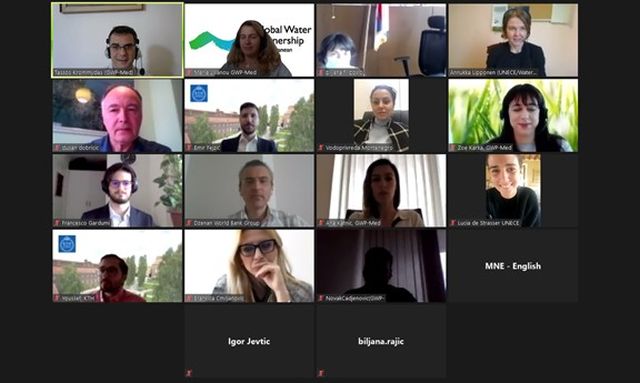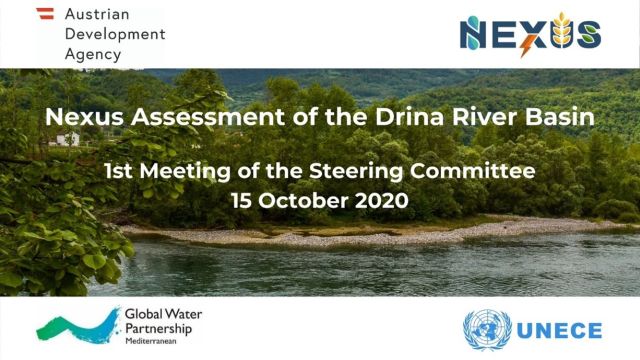Discussion focused on two crucial transboundary issues that were touched upon during Phase I and will form the core of the Phase II Nexus Assessment, aiming to inform decision-making and to enhance transboundary cooperation and inter-sectoral integration:
(i) the future of Renewable Energy in the basin and the riparian countries overall, and the role of hydropower, through the use of an integrated energy-water model under various scenarios, taking into account policy, climate, environmental, resource, technical and budget constraints
(ii) the eventual formalization of relevant aspects of flow regulation among countries and sectors based on relevant international experience.

As also discussed during the meeting, the Assessment will set the basis for the development of a “Drina Nexus Roadmap/Strategy”, a political document identifying key steps to assist the cross-sectoral and cross-border coordination and institutional arrangements that are required to support integrated management of resources in the basin and assist in mobilizing related actions and investments across sectors.
The process of facilitation of transboundary cooperation using a Nexus approach in the Drina river basin goes back to 2016-2017 the (Phase I) Drina Nexus Assessment and then the related activities in 2018-2019 under the “Drina Nexus Follow-Up Project”, both in the framework of the Convention on the Protection and Use of Transboundary Watercourses and International Lakes.
Building up on the outcomes of these activities implemented by UNECE, the development of the Phase II Nexus Assessment for the Drina river basin is now supported by the Austrian Development Agency (ADA) as part of the activities under the SEE Nexus Project (which also involves Nexus Assessments in the Drin river basin and in Albania).
The Steering Committee comprises of representatives of Ministries of the three Riparian countries, covering all Nexus sectors namely water, energy, agriculture and environment:
- From Bosnia and Herzegovina the Ministry of Foreign Trade and Economic Relations,
- From Montenegro the Ministry of Sustainable Development and Tourism, the Ministry of Agriculture and Rural Development / Directorate for Water Management, and the Ministry of Economy / Energy Directorate
- From Serbia the Republic Water Directorate, the Ministry of Mining and Energy, and the Ministry of Environmental Protection.

The Drina Basin is of high importance for the Riparian countries thanks to its rich endowment of water, energy and land resources and due to the unique environment, biodiversity, and ecosystems. At the same time, the river is prone to floods and it is vulnerable to climate change, which is projected to increase the frequency of extreme weather events, such as floods and droughts.
As has been demonstrated in Nexus Assessments in various basins, countries, and regions of the world, transboundary and inter-sectoral cooperation can increase the effectiveness and efficiency of policies on, disaster risk reduction and management, climate action, environment protection, and overall sustainable and integrated management of natural resources and rural development.
The project “Promoting the Sustainable Management of Natural Resources in Southeastern Europe, through the use of the Nexus approach” (2017-2021) is financed by the Austrian Development Agency (ADA) and implemented by Global Water Partnership-Mediterranean (GWP-Med) in partnership with the United Nations Economic Commission for Europe (UNECE).
